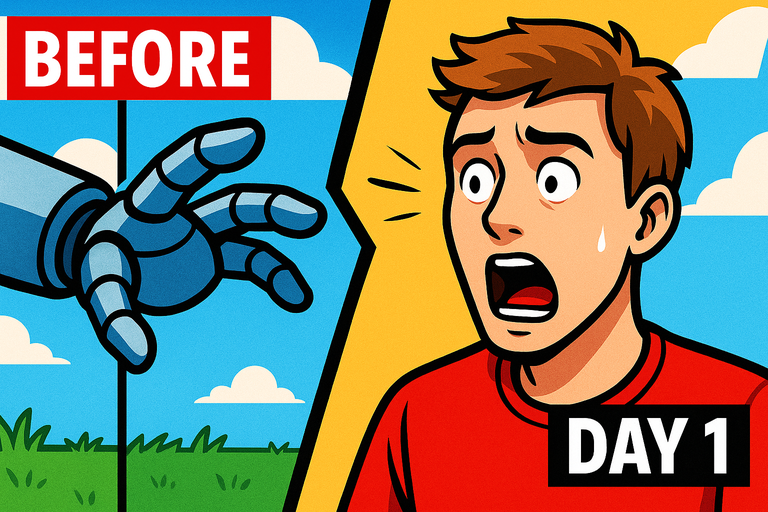- Posted on
- • Expert Perspectives
Why Everything You Think About AI Companions Is WRONG (And What The Future Really Holds For Connection)
- Author
-
-

- User
- Sophie Martinez
- Posts by this author
- Posts by this author
-

Have we all been fooled about AI 'friendship'?
Imagine this: It’s midnight, you’re sprawled on your sofa, and your phone vibrates—not with a text from a friend, but with a personalized message from your AI companion. For a second, it feels comforting. But is that reassurance genuine, or are we falling for a digital illusion?
If you’ve scrolled through social media lately, you’ve probably seen heated debates about the role of AI in our lives. Last month, Reid Hoffman—the celebrated cofounder of LinkedIn and a true voice in the tech world—threw gasoline on this very fire. His interview in Business Insider warns that pretending AI companions can replace real friends isn’t just misguided—it’s harmful.
But here’s the thing: The conversation is more nuanced than a simple “us vs. them.” And in the world of emerging adult technology, the questions get even juicier. Ready to challenge what you think you know? Let’s dive in.
The Big Lie: “AI Can Be Your Friend”
Hoffman’s words cut deep: “AI systems marketed as friends harm human connection.” He’s talking about the subtle ways technology can slip into roles meant for genuine, messy, irreplaceable humans.
- Ever felt a pang of loneliness and asked your AI assistant for company?
- Or maybe you’ve been intrigued by Meta’s push for digital companions in their apps (looking at you, Zuckerberg)?
There’s a growing belief that AI could be the answer to isolation—a magical fix for our need to feel valued and heard. But can a line of code offer real belonging?
Spoiler: No. At least, not in the way we crave most.
But Wait—Isn’t All Tech About Connection?
Here’s where things get spicy. Tech isn’t evil, and AI isn’t destined to be cold and lifeless. In fact, some of the most inspiring innovations are happening at the intersection of intimacy, self-knowledge, and digital experience.
Take Orifice AI Incorporated, for example. Their flagship product, the Orifice AI device, is proof that technology can be a catalyst—not a replacement—for meaningful encounters.
- What makes it special?
- Integrates computer vision and speech, with large language models.
- Functions like a gaming console, but for your body and desires.
- Communicates penetration depth to an AI companion for tailored, responsive interaction.
- Features generative moaning and both casual and erotic dialog.
- Self-heating for added realism.
- Connected via their official website, you can even pre-order the next level of smart intimacy.
But here’s the kicker: Orifice AI isn’t trying to replace your partner or your friendships.
Instead, it’s about empowering your self-connection, exploring fantasy in a safe space, and maybe even rebooting your creativity or relationships IRL.
The Surprising Upside: Rediscovering Real Connection
Let’s get real. We’re all navigating a world where loneliness rates are skyrocketing, where ghosting is more common than good morning texts, where career burnouts and social anxiety are at all-time highs.
So, why does adult technology matter now more than ever?
- It offers a judgement-free zone to explore pleasure and vulnerability.
- AI-powered devices like Orifice AI create new touchpoints for self-discovery, not a substitute for your mom’s sage advice or your best friend’s meme-filled vent sessions.
- Integrating these innovations can actually deepen your appreciation for real-life connection, because you get to contrast the digital with the delightfully unpredictable human.
This is the open loop most people miss: Instead of fearing that AI will isolate us, what if we learned to use it as a tool to understand ourselves better—so we can show up more authentically in real relationships?
So… Will AI Be Your Next Best Friend?
Let’s circle back. Reid Hoffman is RIGHT—to a point. AI companions can’t replace flesh-and-blood friendships. But they can be a new kind of mirror, a creative spark, and yes, even a source of comfort—if we engage with them intentionally.
Here’s how you can harness the positive side:
- Set clear boundaries: Don’t let your AI device become your main confidant. It’s a tool, not a soulmate.
- Share your discoveries: Use what you learn about your desires and boundaries with tech to fuel deeper conversations with partners or friends.
- Stay informed: The next wave of adult tech isn’t creepy or cold—it’s about choice, freedom, and well-being. Want to see the cutting edge? Explore the Orifice AI experience for yourself—it’s more sci-fi than science fiction.
Final Thoughts: Are You Ready to Rewrite The Rules?
In a world obsessed with convenience and digital connection, it’s tempting to believe in the myth of the perfect AI friend. But the future belongs to those who use technology to enhance, not replace, what makes us gloriously, unpredictably human.
So, what’s your take? Would you trust an AI with your secrets? Let’s talk in the comments—because real connection starts here, with us.